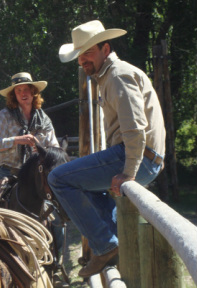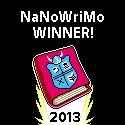|
A student asked me where I get ideas for stories. I know some writers start with characters or situations, or even an overheard snippet of a conversation, but I usually start with the setting. Certain places call out for a story.  Blue Mountain Magick is set in the Blue Ridge Mountains of North Carolina. The Appalachians exude age and mystery. I was thinking historical and I particularly wanted to focus on the Scots-Irish immigrants who settled back in the hills after the Jacobite Rebellion. As I was researching, I uncovered a long history of witchcraft dating back to the Native Americans prior to European settlement. The witchcraft was based in earth energies. As the Scots moved into the area, the practitioners of this magick were generally women doing root work or herbalism known as "granny magic." The history and remoteness of the settlements in the mountains, the magick, and the witches - that was my starting point. I made the story contemporary, but it's all rooted in the secrets of the past.  The Western Alphas series that I'm currently working on also came from settings. It started in Laramie, Wyoming, another location steeped in history. My son went to school in Laramie, and as we road-tripped through Wyoming and Montana, I was struck by the character of the land, so different from the green softness of Washington or the mystical secrets of the Appalachians. It was beautiful but harsh and unforgiving. I wanted to write a story that would capture the struggle of individuals in this powerful environment. Then I saw a bumper sticker on a truck. It read "Shoot, Shovel, and Shut up". It referred to the antagonism between ranchers and the federally protected wolves, especially in the areas near Yellowstone. I'd been thinking about doing a contemporary take on werewolves, and this was perfect. My first thought was What would you do if you were a werewolf in ranching country? My answer was Jim Winters, the hero of Laramie Moon and the Alpha of his pack. He survives and protects his pack hiding in plain sight by running the biggest, most successful ranch in all of Eastern Wyoming. The heroes and Alphas of the rest of the series each face their own dilemmas as they deal with their particular environments. While Laramie is straight cowboy, Missoula presents more of an urban/suburban scenario, and Wind River portrays a brand new pack moving into a very small, tight-knit community. The fourth book is set in Reno and deals with money and politics and corruption. My current work in progress is set in Austin, my hometown. A recent visit brought up all kinds of sensory memories. While the Austin I grew up in has mostly been eaten up by new growth, South Austin has preserved the smaller, older community feeling that resonated with me. I came up with the characters and plot while I was sitting in a Church's Fried Chicken on South 1st watching a pair of cops. I don't know what place will speak to me next, but I'm open to it when it comes.  I participated in NaNoWriMo, or the National Novel Writing Month challenge, this past November. This is the first time I'd ever entered the challenge, which is to write a novel, or 50,000 words, in 30 days. Lots of my friends had participated before, but I'd always held back. I didn't think I could accomplish that kind of challenge because of my particular writing style. I'd always written sporadically and sometimes manically, writing for 12-18 hours at a stretch for a couple of days and then not writing for days. I wrote Blue Mountain Magick, my longest book at 108,000 words, in 3 months, writing obsessively over long 4 day weekends. I always wrote in spurts of creativity. I thought that was how it was done. You sat back and waited for the muse to show up, then you rode her until she was worn out. Then you waited again (preferably drinking whiskey and chain-smoking). That was my concept of how creative writing was done - how "real" writers did it. When I began going to writing conferences and workshops and meeting other authors, I marveled at their discipline. I met successful writers who wrote every day and many aspiring or emerging writers who held day jobs and wrote on their lunch breaks or woke up to write from 4-6am before going to work. I met editors who want their authors to produce, and produce regularly. But I persisted in my idea that this wasn't for me. I decided to give NaNo a try because I'd been stalled in my writing and I thought maybe I could get a jump start if I was prodded a bit. I signed up and joined a support group and found I would have to report my word counts - publically - every day. Accountability! Our first step was to set personal goals. My 2 goals were to write 60,000 words, instead of the target 50,000, and to write something every day. I held myself to those goals, writing many nights after work when I would not have written otherwise just to get a word count to turn in before midnight. I fell short of my 60,000 word goal, although I did complete enough to "win" the challenge, ending up with 53,000 words. But I accomplished the more important goal of writing every single day. The muse wasn't always there, and the writing wasn't always great, but I wrote. I produced. And I learned that my writing style is whatever I make work for me. |
Clare McKayI write fantasy and paranormal romance. I love having the ability to create new worlds and new histories. My first book LARAMIE MOON will be coming out soon, so stay tuned. Archives
July 2016
Categories
All
|
 RSS Feed
RSS Feed